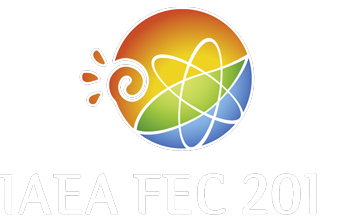Speaker
Dr
Alexey Vertkov
(JSC “Red Star”)
Description
Capillary-porous systems (CPS) with liquid Li, Ga, Sn and Sn-Li alloy is considered as alternative decision under development of plasma facing elements (PFE) for DEMO-type fusion reactor and fusion neutron source. The main advantages of liquid low melting metals in matrix of CPS with respect to solid materials are the possibility to provide surface self-restoring and high resistance to degradation of properties in tokomak conditions. The estimation of considered liquid metals application is carried out on the analysis of their corrosion compatibility with potential base materials of CPS and PFE - W, Nb, Mo, V and stainless steels. The experimental study of corrosion resistance are performed in static isothermal conditions in the temperature range of 400-1400оС. It is shown; that the top temperature limit for operation of PFE based on the CPS with Ga does not exceed 400-500оС. Only the W is compatible with Ga at higher temperature level. The similar situation is detected for structural materials in liquid Sn. Stainless steels are resistant at the temperatures not above 400-500оС and only W and Mo are compatible with Sn at ≥1000oC. In a contrast with Ga and Sn the corrosive activity of Li is low and all considered structural materials are resistant at the temperatures of ≤1000oC. The refractory metals and alloys are resistant to Li at higher temperature level.
In accordance with analysis, the operation window for PFE based on CPS with Ga and Sn is strongly limited on the level of 600oC by corrosion effects on structural materials. The only way to increase the operation temperature is W application as PFE base material. For liquid Li the main reason of limitation is its high vapor pressure at the temperature above 600oC.
| Country or International Organization | Russian Federation |
|---|---|
| Paper Number | EX/P6-50 |
Author
Dr
Alexey Vertkov
(JSC “Red Star”)
Co-author
Dr
Igor Lyublinski
(JSC "Red Star")

